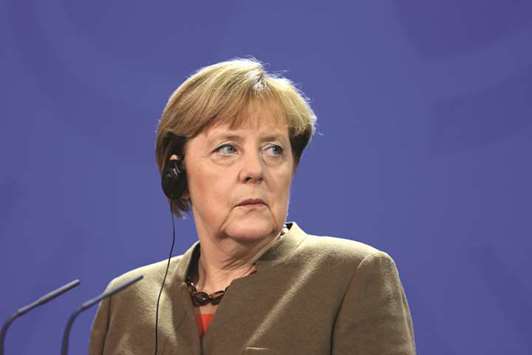German business confidence rose unexpectedly in January to match November’s record high, a survey showed yesterday, suggesting that Europe’s biggest economy continued to fire on all cylinders at the beginning of 2018 despite a stronger euro.
The surprisingly bullish figures, released by the Ifo economic institute, bode well for future growth and give Chancellor Angela Merkel a tailwind as she tries to form a coalition government with the centre-left Social Democrats.
The Munich-based Ifo economic institute said its business climate index, based on a monthly survey of some 7,000 firms, rose to 117.6 in January from 117.2 in December.
The January reading beat expectations in a Reuters consensus forecast of analysts who had forecast a dip to 117.1.
“The German economy made a dynamic start to the year,” Ifo chief Clemens Fuest said in a statement.
The overall improvement was driven by managers taking a stronger view of their current business situation, with the respective sub-index hitting a record high, the survey showed.
Business expectations for the next six months were slightly scaled back, while remaining at an overall high level.
Unicredit analyst Andreas Rees attributed the drop to the higher oil price and the stronger euro exchange rate, which makes exports to countries outside the single currency bloc more expensive.
A sector breakdown of the Ifo figures showed the main support came from manufacturing — where the mood among managers hit a record high — and wholesaling, while sentiment deteriorated in construction and retailing.
“Back to historic high, the euphoric hype of superlatives continues,” said Alexander Krueger, economist at Bankhaus Lampe.
“It’s interesting to see that the political impasse regarding the formation of a government is apparently perceived by companies as hardly disturbing,” Krueger added.
The Ifo figures chimed with data released earlier yesterday that showed German consumer morale rose heading into February to its highest level since 2001, lifted by shoppers’ perceptions of a boom in Europe’s largest economy.
Household spending has become the main source of economic expansion in Germany as consumers benefit from record-high employment, increased job security, rising real wages and low borrowing costs.
The consumer-led upswing has been reinforced by a rebound in exports, propelling German economic growth to a calendar-adjusted 2.5% in 2017.
For this year, the Ifo institute expects an economic expansion of 2.6%.
But GfK economist Rolf Buerkl warned that Germany was still facing risks from abroad. “In particular, the US
trade policy with its protectionist tendencies and the sluggish progress made in the Brexit negotiations could depress the consumer climate as the year unfolds,” he said.
In another positive sign for more growth to come, a survey among purchasing managers showed on Wednesday that Germany’s private sector continued to grow robustly in January, propelled by both factories and services activity.
“For the next government, the tailwind could hardly be better to put Germany on a stable foundation in the long term,” KfW chief economist Joerg Zeuner said, adding more investments were needed, especially in education and digitisation.
“France and the other partners are ready to develop the EU — this is a huge opportunity for our strong export-oriented country,” Zeuner said.

Germany’s chancellor Angela Merkel pauses during a news conference in Berlin. The surprisingly bullish business figures, released by the Ifo economic institute, bode well for future growth and give Merkel a tailwind as she tries to form a coalition government with the centre-left Social Democrats.
